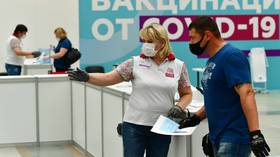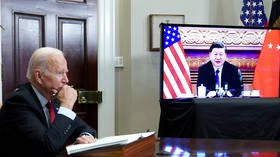Russian MPs schooled on fighting anti-vaxxer claims
Parliamentarians from Russia's governing party have been told how to fight the most common anti-vaccine rhetoric, ranging from claims the pandemic is being used to control people to suggestions Covid-19 jabs are experimental.
Responding to a document seen by Moscow business daily RBK on Friday, United Russia’s press service said the party often “prepares reference materials for deputies on key initiatives, bills, and topical issues,” and that measures to combat coronavirus are no exception.
The guide on vaccination issues outlines how politicians can bust popular vaccine-skeptic misconceptions that crop up in conversations with voters, and narratives circulating in the media. The authenticity of the document has since been confirmed by two of the party’s members.
Lawmakers were told that one myth, which claims that the implementation of QR codes marks “the beginning of a digital concentration camp,” can be dismissed by the fact that Russians’ tax identification numbers were denounced by skeptics when introduced in the early 2000s as a “Satanic codification of people,” but they are now widely accepted.
Likewise, the claim that those who sign up for vaccines are injected with a microchip and then monitored via QR codes was recommended to be rebuffed by questioning why officials would want to control them or be interested in their mundane daily affairs.
The belief that “coronavirus jabs have not been properly studied and their effectiveness has not been proven” can be challenged with the rebuttal that the vaccines were developed from scratch and had been in the pipeline before the pandemic, the document declares.
Despite Russia registering the world’s first Covid jab well over a year ago, and making doses freely accessible, the world’s largest country has seen its national immunization program hindered by high levels of skepticism and reluctance. On Friday, Sergey Netesov, a member of the Russian Academy of Sciences and a professor at Novosibirsk State University, said that fewer than 40% of Russians are fully vaccinated, while around 45% have had their first jab – one of the lowest totals globally.
The Russian government approved the launch of a cash lottery scheme earlier this year to boost the incentive for its citizens to get jabbed. Russians aged 18 or over who had been inoculated against Covid were in with a chance to receive 100,000 rubles (around $1,360).
However, the EU has previously accused Moscow of being behind a campaign to discredit Western vaccines and stir up skepticism about the pandemic. In particular, one report from Brussels’ diplomatic service in April said that the Russian developers of the Sputnik V jab had undermined faith in the bloc’s central regulator, the EMEA, after complaining about long-standing delays in its approval. "By sowing distrust in the European Medicines Agency, pro-Kremlin disinformation actors aim to undermine and fragment the common European approach of securing vaccine supplies," it said.
The makers of the formula hit back, saying that if officials believe “that any specific information is not accurate, we would appreciate an official letter outlining what specific statements seem to be factually incorrect.” The EMEA has still not approved Sputnik V for use, despite its adoption in 71 countries and peer-reviewed data showing it to be among the most effective jabs available.















